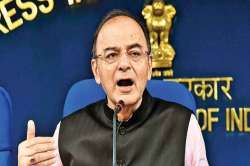Congress supported 'tukde tukde' agitation at JNU by calling it a 'legitimate free speech': Jaitley
In a blog, Jaitley said there were many in India who were opposed to the very idea of partition and amongst the leading opponents undoubtedly was Mookerjee.

Union Finance Minister Arun Jaitley on Friday lashed out at the Congress, saying the party supported the 'tukde tukde' agitation at the JNU by calling it a "legitimate free speech", while the first prime minister Jawaharlal Nehru amended the Constitution to restrict Syama Prasad Mookerjee's advocacy of 'Akhand Bharat'.
Mookerjee, whose birth anniversary falls on Friday, was founder and President of Bharatiya Jan Sangh, the precursor of the Bharatiya Janta Party.
In a blog, Jaitley said there were many in India who were opposed to the very idea of partition and amongst the leading opponents undoubtedly was Mookerjee.
"He was one of the key advocates of a united India which he referred to as 'Akhand Bharat'. Two days before the 'Nehru-Liaquat Pact' was to be signed in April 1950, Dr Mookerjee, who was Industry Minister in the first Cabinet as a Hindu Mahasabha representative, resigned from the Cabinet in protest and took strong public position against the Nehru-Liaquat Pact," the senior BJP leader said.
Mookerjee, he said, spoke extensively in Parliament and outside, opposing the pact and advocating his philosophy in brief of 'Akhand Bharat'.
"Pt Nehru over-reacted to Dr Mookerjee's criticism. He interpreted the very idea of 'Akhand Bharat' i.e. united India as an invitation to conflict since the country could not be reunited other than by war.
"He, therefore, advised Sardar Patel to consider what action would be taken," said Jaitley, who is recuperating from a kidney transplant operation.
After consultation with Constitutional experts, Sardar Patel's opinion was that he could not prevent Mookerjee from propagating his idea of 'Akhand Bharat' under the Constitution and if the Prime Minister wanted him to stop this, the Constitution needed to be amended.
The Bill to amend the Constitution which, amongst others, contained the restriction relating to 'friendly relations with foreign states' was introduced in Parliament, he said, adding it was passed despite objections by leaders like H V Kamath, Acharya Kripalani, Mookerjee and Naziruddin Ahmad.
"Was this intolerance against Dr Mookerjee and his philosophy which triggered this Constitution amendment? The answer is obvious," Jaitley said.
But the major paradox today is that the essence of this amendment was that a mere speech advocating 'Akhand Bharat' is a threat to the country, it can be an incitement to a war and, therefore, any talk of the same could be prohibited, he said.
"It could even be made a penal offence. The paradox in our jurisprudential evolution is that we have applied a different yardstick to those who want to dismember India and commit an offence of sedition. This debate recently came into forefront during the 'Tukde Tukde' agitation at the Jawaharlal Nehru University," said Jaitley, in an apparent attack on the Congress.
In the past 70 years, he said India has witnessed a change in the situation where Pt Nehru amended the Constitution so that a demand for 'Akhand Bharat' could incite a war and therefore should be prohibited.
"On the contrary, we all were told that to advocate a breakup of the country without inciting violence is legitimate free speech," the senior minister said.
A group of students had allegedly raised anti-India slogans like Bharat tere tukde honge (India, you will be disintegrated) at the JNU campus in February 2016 and cases were filed against some students.
The BJP had also criticised Congress President Rahul Gandhi for visiting JNU after the incident.
Read Arun Jaitley's blog here:
